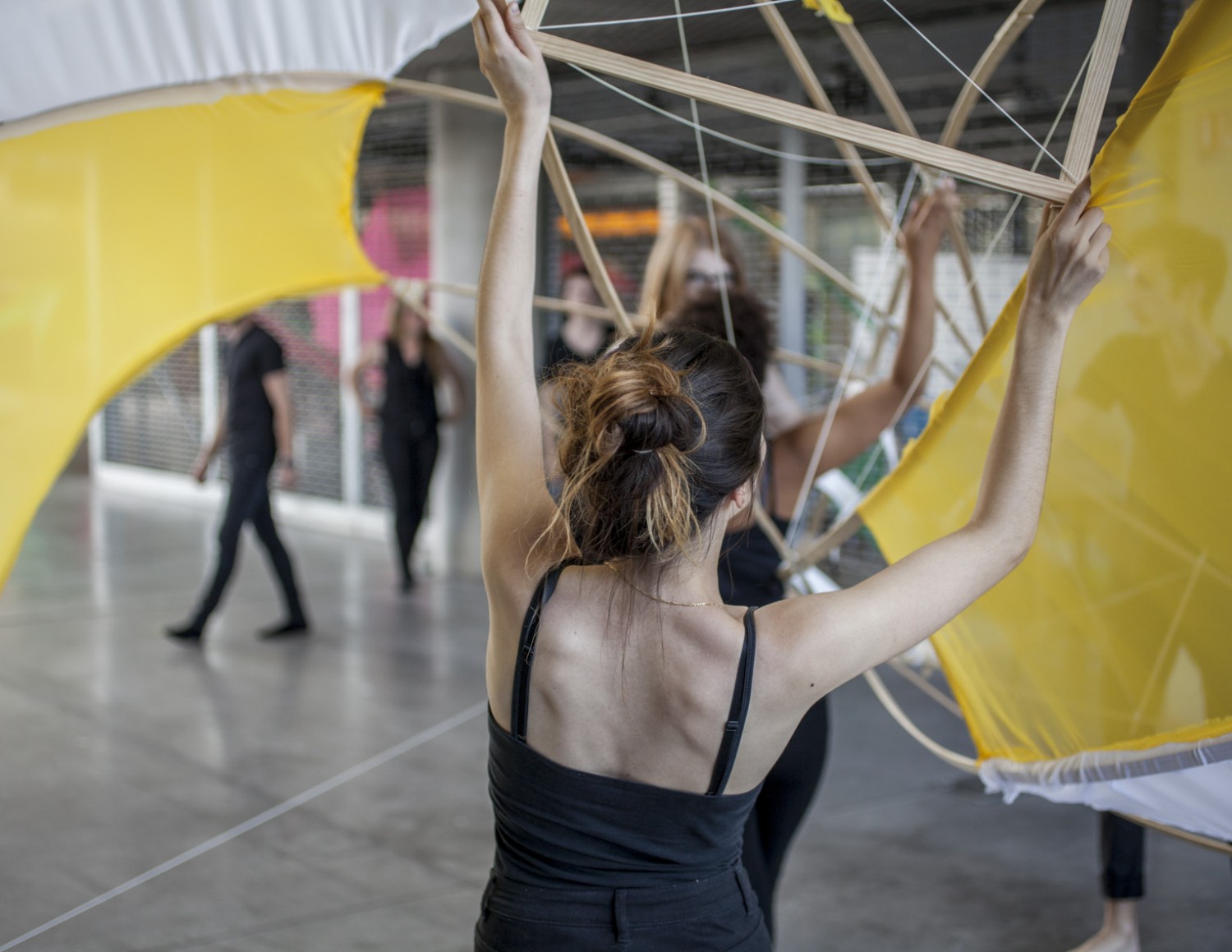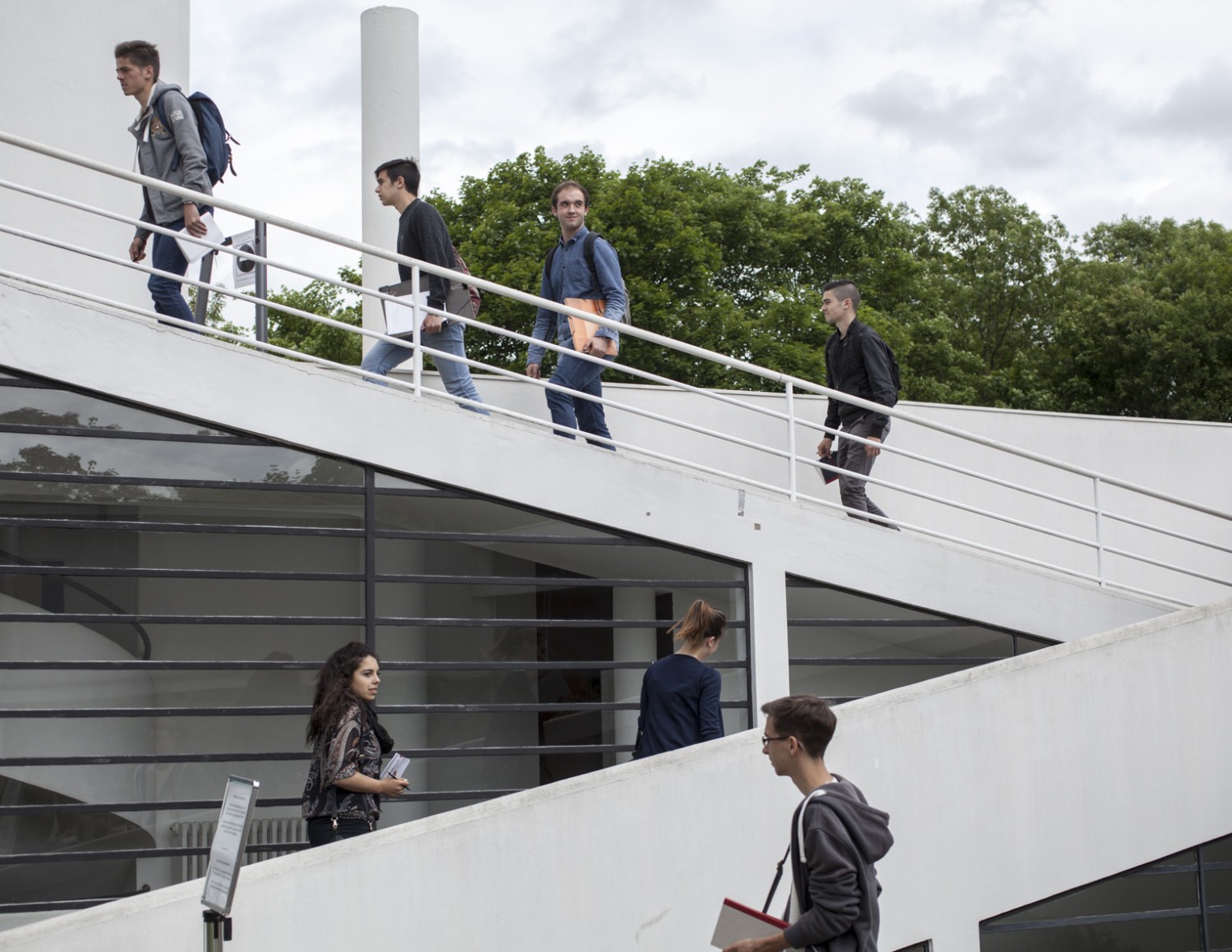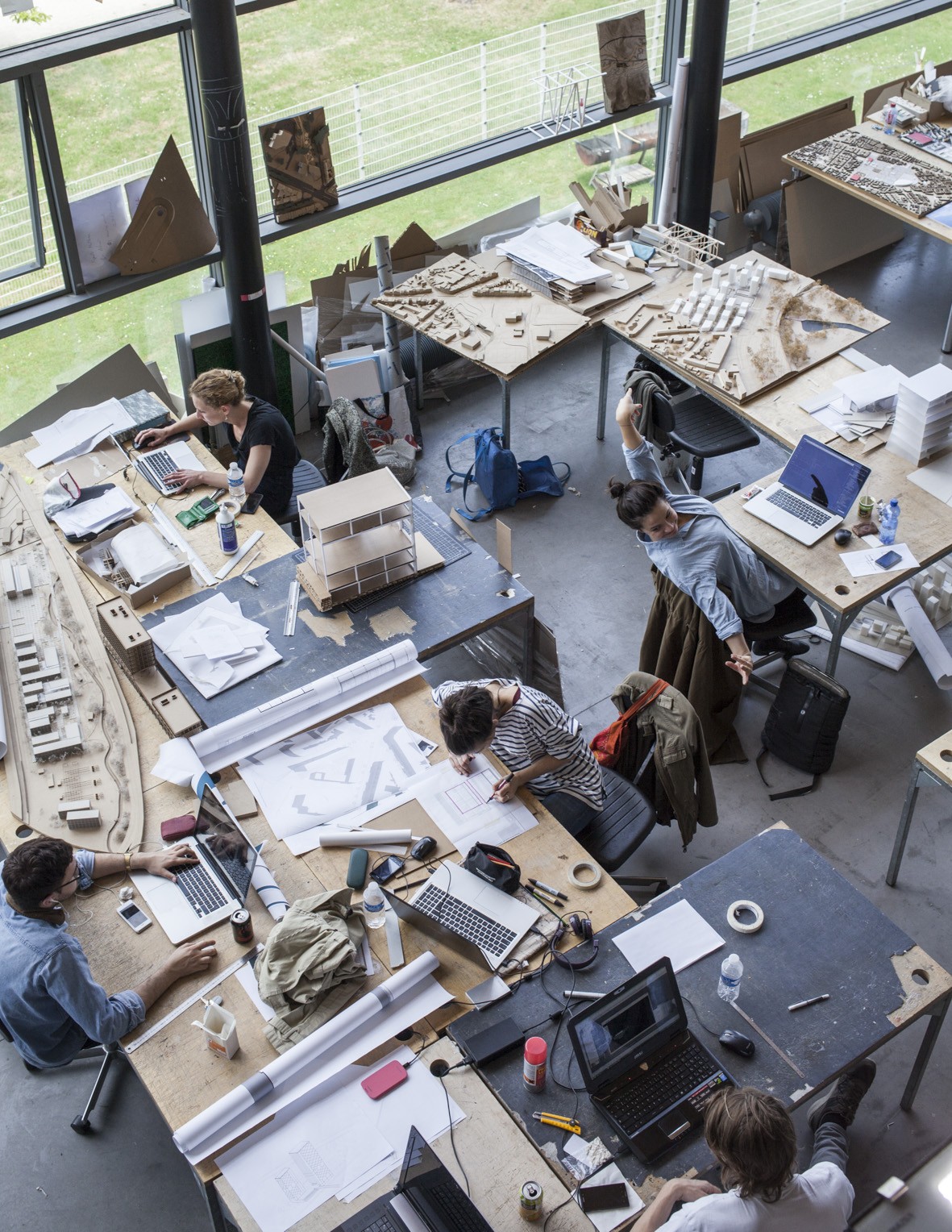Join Us
As part of the ERASMUS + program set up by the European Community or through bilateral agreements signed with non-European universities, the École d'architecture de la ville & des territoires has developed quality partnerships with selected institutions.
Located on a dynamic campus that brings together leading schools and universities, and which has been awarded the "Sustainable City Cluster" label as part of the Greater Paris project, the school welcomes students from foreign schools every year.
Training Offer
Licence
The first cycle gives each student the means to acquire the fundamental knowledge of architecture. In order to avoid the scattering of disciplines, alongside the architectural project, the teaching is not multiplied but refocused on four fundamental fields: territory, history and theory, constructive cultures and representation, which are systematically taught through lectures and/or tutorials.
This first 3-year cycle is sanctioned by the diploma of studies in architecture worth the grade of Licence.
Further information
Master
The second cycle allows students to acquire critical thinking on issues related to architecture.
At the end of this program, students should be able to design an architectural project independently, by deepening their concepts, methods and fundamental knowledge. This program prepares students for the various professional fields of architecture, as well as for architectural research. The second cycle lasts two years and leads to the State Diploma of Architecture, which is equivalent to a Master's degree.
The second cycle is structured around four in-depth courses (Architecture & Experience, Fragments, Thinking Matter and Transformation).
Further information
Post-master
DSA d'architecte-urbaniste
Open to French and foreign architects and landscape designers. This diploma is based on the observation that the architect-urban planner is today totally committed to the project and its representation in space, thus forming, with regard to urban issues, a new profession, which until now has had no specific training in France. This curriculum combines university teaching, professional experience and operational research.
Further information
DPEA Architecture Post-Carbone
Co-produced with the École des Ponts Paris Tech, the DPEA Architecture Post-Carbone course has an international ambition. It focuses on three major facets of the impact of buildings and infrastructure on the environment:
materials and their transformations, the architecture of the structure and envelopes, and their energy content. Commissions from private or public industrial groups condition the thinking and teaching of this cycle.
Further information
How and when to submit an application
The student must be enrolled in one of the School's partner institutions and submit an application to the exchange coordinator at his/her institution, who will check the validity of the application.
The School receives applications from the home university, in accordance with the number of students provided for in the bilateral agreements, before:
- May for the first academic semester
- November for the second semester
Students are advised to study for a full academic year or to choose the first semester.
Please note that exchange students cannot enroll in the second semester of the 5th year because this time is entirely devoted to the diploma (PFE).
The letter of acceptance will be sent by the School to the university of origin in:
- June for the first academic semester
- November for the second semester
Preparing for departure
As soon as you receive your acceptance letter (in June or December), you must begin certain procedures and obtain the necessary documents for your arrival in France and at the École d’architecture de la ville & des territoires. We invite you to consult the welcome guide for international students at the Université Paris-Est.
Here is the list of compulsory documents to bring with you, which are essential to carry out administrative procedures when you arrive in France:
For citizens of the European Union or the European Economic Area:
A valid identity card or passport,
A European social security card from your country of origin,
A certificate of civil liability insurance that guarantees you against damage that you may cause to others (this insurance is usually associated with your home insurance in your country of origin: make sure that it covers damage caused abroad and if not, take out this insurance in France, at a modest cost).
For non-European Union and non-European Economic Area nationals:
A valid passport,
A long-stay visa with a student mention (VLS-TS étudiant),
A certificate of civil liability insurance that guarantees you against damage that you may cause to others (this insurance is usually associated with your home insurance in your country of origin: make sure that it covers damage caused abroad and if not, take out this insurance in France, at a modest cost).
For Quebecers:
A valid passport,
A SE 401 or Q 106 form for social insurance,
A certificate of civil liability insurance that guarantees you against damage that you may cause to others (this insurance is usually associated with your home insurance in your country of origin: make sure that it covers damage caused abroad and if not, take out this insurance in France, at a modest cost).
The student permit: long-stay visa validating the student residence permit (VLT-TS)
Campus France
Visa France
International student ID card
The ISIC card, International Student Identity Card, proves your status as a student throughout the world.
It is useful for travel and allows you to benefit from many services at advantageous prices: national and international transport, foreign currency exchange, traveler's checks, accommodation, restaurants, theatres, museums, castles, concerts, operas, and various leisure activities.
The cost is €13. It is valid from September 1st to December 31st of the following year. An ISIC International guide will be given to you at the same time as the card. You can ask for it before leaving or at your arrival, on the website www. isic.fr.
Opening a bank account
To benefit from certain RATP fares (public transport) or to receive a housing allowance from the Caisse d'Allocations Familiales, you must open a bank account in France.
To open an account the following documents will be required:
- a passport or identity card,
- a proof of residence,
- a visa if you are a non-European student,
- an attestation certifying that you have been accepted for a year or a semester at the School.
To change your Travelers Cheques into €, go to a post office with your national identity card or passport.
Social Security coverage in France (La sécurité sociale)
In anticipation of your arrival in France, you must request your affiliation to the French social security system by registering on the dedicated website etudiant-etranger.ameli.fr.
You are required to attach the following documents:
- your identity (national identity card, passport),
- your registration in a higher education institution for the academic year in question, in order to prove your status as a student,
- your bank account number (IBAN) which will be used to pay your refunds,
- a civil status document required to create your identification number (commonly called "numéro de sécurité sociale").
The accepted civil status documents are:
- a full copy of the birth certificate,
- a birth certificate extract with filiation (or any document established by a consulate),
- a family record book,
- a wedding certificate.
- Finally, for foreign students, a legal residence permit must be presented. To find out if you have a permanent residence permit or to find out about the formalities for obtaining one, contact the French consulate in your country or consult the information available on Campus France.
- International agreements and conventions may require other documents. Please refer to the section below entitled "Other documents for your registration according to your country of origin".
Keep the provisional social security number that was automatically assigned to you by the site and print your certificate of entitlement.
Supplementary insurance
The complementary insurance allows the improving of the rate of reimbursement of medical expenses, it is not mandatory.
Social security reimburses about 70% of medical expenses. With a complementary insurance the patient can be reimbursed up to 100%.
Housing subsidies
In order to guarantee access to housing for all, a system of housing subsidies has been set up by the French government. Depending on the nature of your accommodation, your income and the composition of your household, you may be able to receive financial assistance to reduce the amount of your rent. Housing subsidies are managed by the Caisse d'Allocations Familiales (CAF). It is to the CAF that you must send your request for an allowance, and it is the CAF that will determine if you are eligible and the amount of the allowance. As these criteria are numerous, it is impossible for us to give you the amount of these allowances here. You have the possibility to evaluate it thanks to the calculation module of the CAF.
We advise you to apply for housing assistance as soon as you move into your new accommodation. The allowance can be paid to you or directly to your landlord. Your rent will be reduced accordingly.
There are several types of housing allowances. These benefits cannot be combined
You can only receive one of these allowances. The CAF will determine, according to your file, the allowance to which you are entitled.
Finding accommodation
The School has reserved rooms on campus. We invite you to let us know as soon as possible if you would like to take advantage of them.
Other means of accessing housing are possible: Crous, university residences, rentals etc. This guide provides a few suggestions, which are not exhaustive. However, it should be noted that it can be particularly difficult to find housing in Paris for a student with limited resources.
Cité Descartes International Residence
https://access.ciup.fr/logement-en-ile-de-france/la-residence-interna-tionale/
Accommodation for a short stay in France (students)
https://access.ciup.fr/logement-en-ile-de-france/se-loger-pour-un-court-sejouretudiants/
University Housing
You can consult the following university housing organizations for information purposes; they are in no way endorsed by the school.
CROUS DE CRETEIL 00 33 1 45 17 06 60
www.crous-creteil.fr
RESIDENCES DU VAL MAUBUEE ET DE MARNE LA VALLEE
00 33 1 60 37 24 24
www.san-valmaubuee.fr
RESIDENCE LES ESTUDINES
www.estudines.fr
In order to facilitate your daily commute, you can concentrate your search around the RER A line stations. The school is only 20 minutes away from the Place de la Nation (Paris).
Ask for information from students from your school who have already come on exchange to the École d'architecture de la ville et des territoires and/or to Paris.
For your information, here are the main French private rental and roommate websites:
www.appartager.com
www.leboncoin.fr/colocations
www.colocations-ile-de-france.com
www.ton-appart.com
We also invite you to join the Facebook groups of the student associations, to ask all your questions and to look for housing ads:
BDE Archi Marne Bureau des étudiants de l'École. www.facebook.com/AVEDescartes AVED (Association de la Vie Étudiante du campus Descartes).
Finally, there are pitfalls to avoid, especially if the offer seems unexpected and your contact asks you to "prove that you are really interested" by making an advance payment. Never send money before you have visited the property
Private apartments
There are many websites dedicated to real estate ads. These sites will also give you useful advice: rental contract (lease), comprehensive home insurance, housing assistance, etc. You can consult
www.parisetudiant.com, www.espace-etudiant.com, www.pap.fr, www.seloger.fr, www.mapiaule.com, www.pro-a-part.com, www.avendrealouer.fr, www.appar- tement.org, www. locservice.fr, www.location-etudiant.fr, www.lokaviz.fr, www. lodgis.com.
At the School, check the bulletin boards at the entrance where offers are sometimes made.
Budget
It is important to arrive with a sufficient budget for the initial costs of your installation.
Here is an idea of what you might have to spend. These figures are a rough estimate.
- Housing: 400-700€/month
- Transport: 40€/month (with the card www.imagine-r.com)
Your welcoming to the School
End of August - mid September schedule
INTENSIVE COURSE: " French as a Foreign Language (FLE) and cultural activities " The purpose of these immersion courses in France is above all to allow students to use their knowledge of the French language in an active way so as to facilitate a better integration, as all courses are given in French. This FLE internship lasts two weeks.
Moreover, this internship is credited with 2 ECTS that you can register on your Learning Agreement.
It is therefore strongly recommended that you participate. To do so, you must have indicated this in the online questionnaire that will be sent to you once you have been nominated by your home institution.
In addition, architectural visits in Paris are organized to familiarize you with the city and the technical vocabulary. This program is also credited with 2 ECTS.
Early September:
Finalised Learning Agreement
During the pedagogical registration, the Learning Agreement will be finalized according to the possible modifications of the timetable and the proposed courses.
Mid-September:
Registration: welcome of foreign students Start of 1st cycle -1 semester courses
End of September:
Beginning of the 2nd cycle -1 semester courses
Early February: End of 1st and 2nd cycle courses End of February: Beginning of 1st and 2nd cycle courses
Early July: End of 1st and 2nd cycle courses
Applying via CampusArt
CampusArt is a network of French institutions offering training in the field of arts and architecture, led by Agence Campus France, with the support of the French Ministries of Education, Higher Education, Research and Innovation, Europe and Foreign Affairs, and Culture.
This service is entirely free of charge until the candidate decides to accept a training proposal.
The choice of training is accompanied by a fast and interactive online application process, available worldwide, allowing foreign students to fill out a single application form that can be viewed by over 110 institutions.
For international students interested in studying architecture, CampusArt, the online application website, opens in December and usually closes in February.
An answer to the application will be given in March, allowing you to prepare your stay as soon as possible.
Studying as part of an exchange program
The student must be enrolled in one of the School's partner institutions and submit an application form. It is advisable to contact the person in charge of student mobility in your institution to obtain an application. Students are advised to study for a period corresponding to a full academic year or to give priority to the first semester (September to February). The second semester of the Master 2 is not open to incoming mobility.
Coming as an individual
Before coming and engaging in an admission procedure, it is advisable to consult and choose the School's courses. Depending on your situation and your host country, applications can be made on different platforms. You will find more information on the website of the Ministère de la Culture.
French Language Support
The School organizes French as a Foreign Language (FLE) support courses for exchange students.
Mobility Coordinator
Estefania Nuchera
Héléna Antablian
Erasmus+ charter
Training offer
Licence
Master
Post-master DSA
Post-master DPEA
Erasmus documents to download
learning agreement semester 1
learning agreement semester 2
Pedagogical offer
come studying at Éavt
International students
Blue file
procedure
Useful links
ciup
crous créteil France Alumni Campus France
Visas and residence permits
Accommodation



